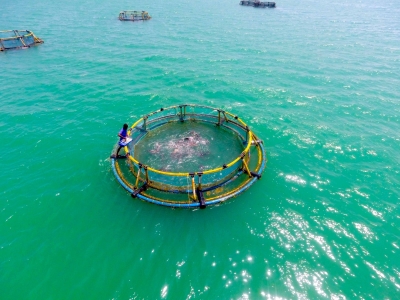Kochi: According to a new study by the ICAR-Central Marine Fisheries Research Institute (CMFRI), it has been found out that mariculture has emerged as a promising business opportunity for India’s coastal regions, offering decent income to the people even as extreme weather events like cyclones are leading to the reduction of fishing days every year.
The study found out that Cage fish farming in the open sea and coastal waters could yield an additional income of up to Rs 3 lakh per unit.
The study examined the social, environmental, technical and economic aspects of 159 mariculture units such as cage farming, seaweed cultivation and Integrated multi-trophic aquaculture (IMTA) in six coastal states, including Kerala.
The innovative practice of IMTA, which combines mussel or seaweed cultivation with cage fish farming, was found to generate even higher profits of Rs 3.25 lakh per unit.
Incidentally, Kerala exhibited higher profitability in coastal water cage farming compared to other coastal states, with nearly 40 per cent of such units in the state generating an income ranging Rs 2 lakh to 3 lakh per season.
Andhra Pradesh realised greater profitability in open sea cage farming while the IMTA practice was found to be more profitable in Tamil Nadu.
The study titled ‘Sustainable intensification of small-scale mariculture systems: Farm-level insights from the coastal regions of India’ were published in the international research journal Frontiers in Sustainable Food Systems.
The study led by Dr Shinoj Parappurathu, Senior Scientist of the CMFRI also highlighted that mariculture augmented employment and gender inclusion among the coastal communities across the country.
Marine cage farming and the IMTA generated 175-396 person-days of employment from one unit in a season lasting around eight months.
Seaweed cultivation along potential farming sites was found to be highly prospective, given the increasing demand for seaweed-based products for culinary purposes and pharmaceutical and other industrial uses.
The CMFRI study also identified challenges in the sector, including the scarcity of quality seed and feed. Less than 50 per cent of farmers received good quality seed for culture.
Limited access to institutional credit to meet capital and the operational cost was reported to be another major constraint in the sector.
Parappurathu said the lack of legislative provision puts this prospective sector under the shadow of uncertainty, ultimately hindering large-scale business plans in mariculture.
“Adequate legislative mechanism is required to ensure legitimate access for farmers to open water bodies. Respective state governments should intervene to provide this protection to farmers so that production could be augmented,” said the CMFRI scientist.
–IANS


Comments are closed.